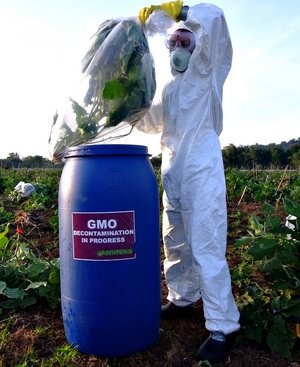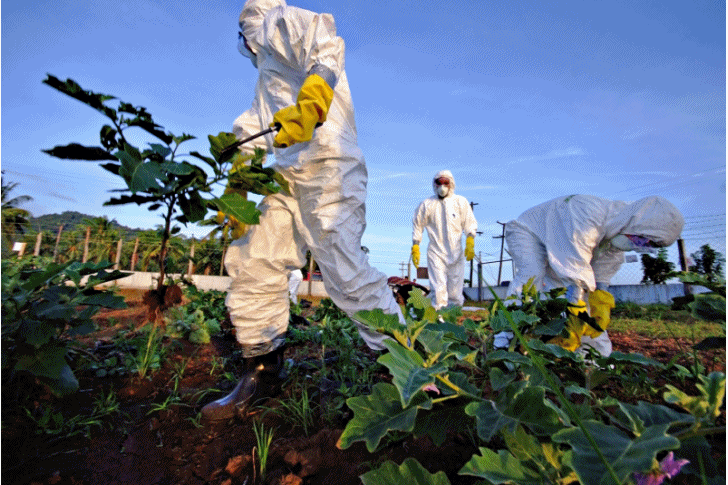 ?
?
Bay, Laguna, Philippines
A Greenpeace decontamination unit today removed genetically-engineered Bt eggplant, locally known as ?Talong', from a field trial site in Barangay Paciano Rizal in Bay, Laguna, and sealed the experimental food crop in hazmat (hazardous materials) containers to prevent further contamination of neighboring fields and the environment.? ?
The Greenpeace activists were supported by organic farmers from Davao who had participated in a similar operation carried out by their provincial government last year.?
"Greenpeace is taking action today to prevent any further contamination from these hazardous genetically engineered crops.? This Bt eggplant experiment poses a threat to the environment and to farmers' livelihoods, aside from violating the spirit of the Organic Agriculture Act. ?Once these experimental GMOs (genetically modified organisms) flower, their pollen can contaminate both conventional and organic crops, irreversibly damaging them,"?said Daniel Ocampo, Sustainable Agriculture campaigner of Greenpeace Southeast Asia.? "The public has the right to a safe environment and to food sources that are not genetically engineered.? If the authorities, such as the DA, fail to uphold those rights, then it becomes legitimate for others to do so."

Members of a decontamination unit from environmental activist group Greenpeace collect, bag and bin genetically-engineered Bt talong (eggplant) from an experimental field trial site in Bay town in the province of Laguna, in an effort to contain contaminants, February 17, 2011. ? Veejay Villafranca/Greenpeace
Greenpeace has called on the Department of Agriculture (DA) to:
- Halt all Bt eggplant field trials in the Philippines and decontaminate all existing field trial sites with immediate effect;
- Implement the Organic Agriculture Act and ban genetic engineering of all food crops in the Philippines.
- To take?an active role in supplying sufficient quantity and quality of non-Bt seeds and support organic and ecological?agriculture practices.
Bt eggplant field trials commenced in 2010 despite massive protests by farmers and consumers.? Of the seven selected trial sites, Davao City, Baybay in Leyte, and Sta. Barbara in Iloilo, have issued municipal and barangay resolutions banning the field trials.? Similar statutes are still in process for Pangasinan, Laguna, Camarines Sur and North Cotabato, where field trials are already underway.? Field trials were also conducted in Davao city last October but the plants were uprooted by the local government to uphold a resolution banning the trials.
"Like in India, there is no public support for Bt eggplant field trials and it is just not right for a few GMO proponents to conduct an open experiment that can inflict grave and possibly irreversible risks to an unsuspecting public," added Shivani Shah, the sustainable agriculture campaigner from India who was on-hand to provide support to local efforts in implementing a shift to sustainable farming practices
The Bacillus thuringiensis (Bt) eggplant is genetically-modified to contain a built-in toxin to kill the fruit-and-shoot borer insect.? It is currently not approved in any country including in India where the technology was sourced for use in the Philippines.? Last February 2010, the government of India passed a moratorium on Bt eggplant commercialization to protect the country's agriculture.? In its decision, the Environment Ministry said that the science behind Bt eggplant is inadequate to answer the concerns raised by civil society groups, and that the country's GMO regulatory system is inadequate.
An analysis of India's Bt brinjal (eggplant) biosafety data by Professor Gilles-Eric Seralini, a French scientist, released in 2009 shows that the GMO eggplant is unsuitable for human consumption. ?The analysis concluded that Bt brinjal released into the environment, for food or feed, may present a serious risk for human and animal health.[1] ?
"Greenpeace is urging DA Secretary Prospero Alcala to categorically ban all Bt Eggplant field trials.? He has already stated that Bt eggplant will not be commercialized, which renders the field trials irrelevant. ?Safety concerns on Bt eggplant are still unanswered, and the risks are even more disturbing given the Philippines' very lax and permissive regulatory systems.? Only by halting the further entry and approvals of genetically engineered food crops can the DA achieve its goal of food security and sustainable agriculture in the country," concluded Ocampo.
Greenpeace campaigns for agriculture that is good for the planet and people; healthy food grown with the environment - not against it; and farming that will help us cope with climate change.
Posted at: 02:01 | Add Comment  |
|  |
|  del.icio.us
del.icio.us